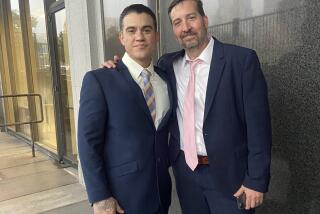Doctor Says Despair Drove Man to Kill Fiancee : Trials: A well-known psychiatrist testifies that Timothy J. Velasco was overwhelmed by emotion when he committed the ‘perversely loving act of homicide.’
- Share via
The psychiatrist credited with inventing the Twinkie murder defense said Wednesday that Timothy J. Velasco was overwhelmed by feelings of love and despair when he killed his fiancee last October.
“He was operating out of his feelings for this woman, rather than what was best for her,” said Bay Area psychiatrist Martin Blinder.
After Blinder testified that junk food was a factor in the 1978 slayings of San Francisco Mayor George Moscone and Supervisor Harvey Milk, the jury convicted former Supervisor Dan White of manslaughter rather than murder.
But jurors hearing the Velasco case in Ventura County Superior Court probably will not be allowed to consider the “heat of passion” defense Velasco’s lawyer is trying to establish, Judge Steven Z. Perren said.
Velasco, 22, of Van Nuys, is accused of murdering Ellen Cleary, 37, at her Thousand Oaks condominium about an hour after discovering her having sex with her physician.
Deputy Public Defender William McGuffey has tried to show that Velasco was responding to strong emotions when he killed Cleary and that he is guilty of voluntary manslaughter, not murder. If convicted of voluntary manslaughter, Velasco would face a maximum sentence of 13 years, while first- or second-degree murder carries a maximum term of life in prison.
The discovery of Cleary having sex with her doctor, combined with Velasco’s belief that she was slowly killing herself with alcohol and pills, prompted him to kill her out of love, McGuffey said.
But Perren said he has tentatively decided not to let the jury return a verdict of manslaughter. Citing several precedents, he said such a defense is valid only if the passion claimed by the defense “would be aroused in an ordinarily reasonable person.”
“The defendant can’t set up his own standards,” Perren said.
He noted that, after the physician left Cleary’s house, she and Velasco had lunch, talked and made love. “Then he decides out of compassion for her . . . to kill her,” Perren said. “In no way, in my estimation, can that be interpreted as manslaughter.”
But Blinder said Velasco was “functioning largely on an emotional level” when he committed “this perversely loving act of homicide.” He said Velasco was not jealous of the physician but felt despair when he saw that “this potential source of help was in fact aiding and abetting her degradation.”
The physician, Don Alan Lee of Westlake Village, testified that Velasco was surprised but calm after arriving at Cleary’s home shortly after noon. Cleary sat on the couch holding Velasco’s hand while Lee dressed, the doctor said, and Velasco shook hands with him before Lee left.
Lee, whose lawyer was present during his testimony, admitted having a sexual relationship with his patient and said he had prescribed lithium for chronic depression. As he was leaving the courtroom, he declined to say whether he is being investigated by state medical authorities.
Perren granted two five-minute recesses during Lee’s brief testimony when it appeared that Velasco was becoming agitated. Two deputies were summoned to augment the extra security already in place since Velasco tried to attack a news photographer Monday.
In that incident, Deputy Mark Hanks had to subdue Velasco after he took a swing at Roger Hardy, a photographer for the Thousand Oaks News Chronicle. No one was hurt.
Closing arguments are scheduled for today. The eight-woman, four-man jury is expected to begin deliberations Friday.
More to Read
Sign up for Essential California
The most important California stories and recommendations in your inbox every morning.
You may occasionally receive promotional content from the Los Angeles Times.













